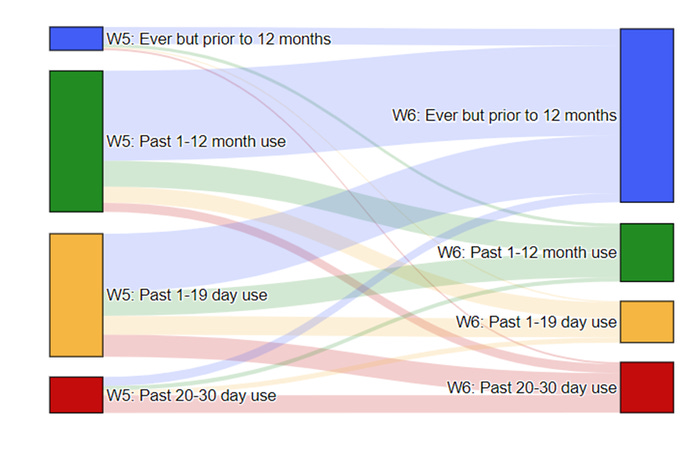My Origin Story
I have a bachelor’s degree in physics from Cornell University and a PhD in cognitive neuroscience from Rutgers University. After graduating, in hopes of applying my quantitative skills to something broadly health-related, I spent a decade in academia (postdoc and two junior faculty positions) studying adolescent smoking behavior and nicotine dependence.
Around 2014 when I was an assistant professor, e-cigarettes started getting a lot of attention. I initially believed the one and only narrative I had been hearing: that e-cigarettes are harmful, attractive to kids, and a gateway to smoking. One of my main expectations in that job was to publish scientific articles, so I set out to publish what I thought would be a great paper in support of the gateway idea… and the results did not align with that narrative. I ended up changing my mind with my own research. I was finding no evidence that e-cigarettes were causing adolescents to smoke — if anything, my results were more aligned with the opposite idea: that e-cigarettes could be preventing adolescents from ever starting to smoke, and thus displacing a much more risky behavior.
Unfortunately, what I thought was an interesting and thought-provoking scientific question was getting nearly no engagement from most of my academic colleagues. Combined with my inability to get grant funding, I ultimately left academia after deciding I could have greater impact on the real world by consulting for industry and pursuing tobacco harm reduction (THR).
I’m also interested in behavioral and health science more broadly. One of my biggest personal interests is nutrition research, where I had another complete reversal of opinion after figuring out that what worked best for me (keto/carnivore with fasting) was very different from the recommendations of mainstream science.
Current Activities
I work primarily as Senior Scientist at Pinney Associates, where I consult to Juul Labs on behavioral science related to tobacco harm reduction. Some of my notable work in this area has shown that, after purchasing JUUL, the majority of adults who smoked either stopped completely (58% at 2 years) or substantially reduced their cigarette consumption, and that those using a JUUL flavor different from their usual cigarette flavor were more likely to stop smoking. This behavioral research was one of many important pieces of evidence that went into the US Food & Drug Administration’s authorization of JUUL products as appropriate for the protection of public health.
I also consult individually to CoEHAR at University of Catania on e-cigarette behavioral research, where we are trying to improve the quality of research on e-cigarette use and health effects. There are very common, but partly avoidable, flaws in this research, which we covered in a 5-minute video. We also critically appraised the evidence on respiratory outcomes, and a related systematic review found that e-cigarette use may be associated with mild symptoms such as coughing or wheezing, but evidence is lacking for more serious or clinically-relevant risks.
I am a fairly prolific producer of published research (PubMed bibliography), primarily related to my above consulting work, but also (as a recovering academic) my own unfunded side projects when I have time.
I am also a voracious consumer of research on nicotine/tobacco use; with Clive Bates, we informally review ~30-70 new papers each week on PubMed as a pro-bono activity for the THR community. Stemming from this work is a separate effort to compile a list of common flaws and develop a “how-to” guide for interpreting this research, since we see the same recurring flaws in the literature week after week.
I now always communicate my research to more public audiences on social media (Twitter/X and LinkedIn) and will continue to do so here in a longer format.
What to Expect in This Substack
If you don’t follow me elsewhere, welcome!
If you do already follow me elsewhere for my THR work (Twitter/X, LinkedIn, or my weekly PubMed reviews), the benefit of subscribing here is longer-form posts that won’t easily fit on other platforms. I’ll also have broader (beyond THR) content here about issues in academia, the state of the research, and parallels and flaws in other research fields.
In this Substack, I’ll focus primarily on THR but also more broadly on behavioral science (including nutrition, neuroscience, and health/medical research):
Sharing my own research
Reviewing other published studies (favorably or not)
Covering common recurring flaws I see in behavioral research
Discussing structural problems in academia and academic research
Time permitting, weekly highlights and lowlights of new research
My content on Substack is entirely my own and does not necessarily reflect the views of my employers or clients.
Why Subscribe?
I am new to this platform so my thinking on this may evolve as I get familiar with it and if I get more traction.
I will make my main THR content available for free and don’t want anyone to feel pressured to pay (especially THR advocates and consumers). I will keep doing this even if I get no money, but I will accept voluntary donations from anyone who’s able and willing to support my efforts.
I may restrict some features to paid subscribers (e.g. commenting if it’s not done in good faith). I may decide to paywall some posts if I’m not comfortable sharing the content publicly for whatever reason (e.g. work in progress or more speculative/opinion-based posts).
As a perk to subscribers, time permitting, I will take requests for scientific studies to informally review and critique.





This is super fascinating. I recently worked at a substance use non-profit that has a program for tobacco education. They are adamantly against smoking in any form including vaping and are having a tough time coming around to the harm reduction perspective. Your research might persuade them to be more flexible in their approach.